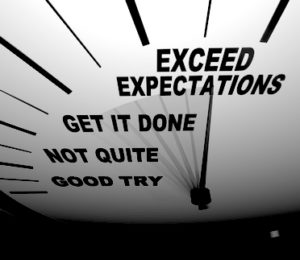The hard hitting fact is that if a business does not identify, acknowledge and act on poor performance it can only expect dissatisfied customers, attrition of sales and limited growth. These headline issues are just the tip of a very big iceberg! Below are some example early warning signs of poor performance…
Early warning signs of poor performance in frontline staff
- Poor throughput – queuing customers are the norm and not a key mindset?
- Not getting value for money – a fair days work for a fair days pay
- Wide spectrum delivery –the range of performance is wide
- Poor quality of work sent to customers – increasing rework
- Lack of engagement and connection from the staff –a poor results in internal staff satisfaction levels
- Every monthly review shows the same levels of under target performance and little or no action plans
“Don’t lower your expectations to meet your performance. Raise your level of performance to meet your expectations.”

Early warning signs of poor performance at management level
- 121/performance reviews are missed or not timely
- Training plans are moved backwards
- Teams only working to task with only a short term view in place
- Compliance actions become overdue
- Outstanding work load volumes increase – customers are waiting longer to be served uncontrolled backlogs increase in outstanding levels of primary and secondary controls activity
- Barrier between back and front office and blame
Early warning signs enable you to take corrective action before the problems escalate, feeding through into customer service levels and net promoter score, and ultimately into more tangible indicators such as customer retention, new business acquisition and revenues. Poor performance also negatively impacts the return on investment in sales and marketing activity, as poor customer experience stifles conversion of promising leads.
The right performance management frameworks
A well-structured management framework is essential to delivering consistently high operational performance. And the first step to creating an effective framework is to ask yourself and your Director of operations some searching questions:
- Are the measures you have in place consistent across teams and departments?
- When were measures in place last reviewed and calibrated?
- How does your company incentivise and reward customer-facing teams?
- How do you incentivise and reward managers both metrics and behaviours?
- When did you last review a range of high – low performances specifically whether the actions plans are making a difference?
- What measures are in place to manage under performing individuals and teams?
- What actions are in place to move ‘on target’, higher performers forward? One which is too often missed
- What behaviours are being measured and this does not just mean the company values statement.
If you can confidently answer each of the above questions, then you should be well-placed to implement a framework and culture that will deliver increased throughput, quality and improved customer experience. If you’re not confident with your answers, a fundamental review of your performance management framework is a good place to start.
“The true measure of the value of any business leader and manager is performance.”

Achieving high performance
There’s a huge body of evidence that most employees want to do a good job. But if you fail to show them what “good” looks like, you’re not giving them the chance to reach their potential. So make sure every employee knows precisely what is expected of them, both in terms of specific KPIs and also behaviour.
With the right performance metrics in place, and appropriate rewards to incentivise positive behaviour, good individual performance becomes desirable, and good operational performance becomes achievable and sustainable.
When was the last time a department head observed a senior manager undertake 121s and a senior manager observe team managers undertaking 121s – in most companies undertaking reviews is a significant investment in each team managers week and a significant cost to the company yet how do you know its effective, and delivering the outcome you want and need.
It’s essential your front line managers have the ability to identify, acknowledge and ACT
Do your managers have a robust measurement framework that presents them with management information to analyse positive and negative performance and then ACT?
Have your managers received training to effectively connect with team members, do they understand allocation of responsibility and instil accountability to team members to ensure delivery on actions plans?
We all know what SMART stands but are your managers using SMART in their performance reviews? Are there SMART actions identified and implemented from reviews? You can only answer this through observation and review of paperwork.
Performance management is a complex subject but I can assure you it isn’t just about training courses to get accreditations in regulations and rules. To achieve sustainable high performance you need a more holistic approach. Mangers need to learn how to become engaged and connected with individuals, understanding what motivates and how to implement it. They need to ensure there is responsibility and accountability and be able to identify and act to reward positives and promptly deal with negatives.
To achieve high performance you need to ask yourself if you’re a company that is invested in rules and regulation training, creating technical managers, or whether you are invested in your manager’s people skills enabling them to identify and ACT to deliver consistently high performing teams.
Don’t lose focus
It’s often all too easy to focus on underperformance. But its also about high performance and how to maintain that. And that’s not just maintaining high performance in lower level staff but right the way through to senior management.
Have you ever questioned how much effort you spend on underperformance vs how much effort is spent on high performance?
If you tipped that balance what could you gain?
To find out more about maintaining performance or improving under performance why not get in touch with us. We have years of experience and a robust and proven methodology to deliver consistent, sustainable high performance throughout your operation.



